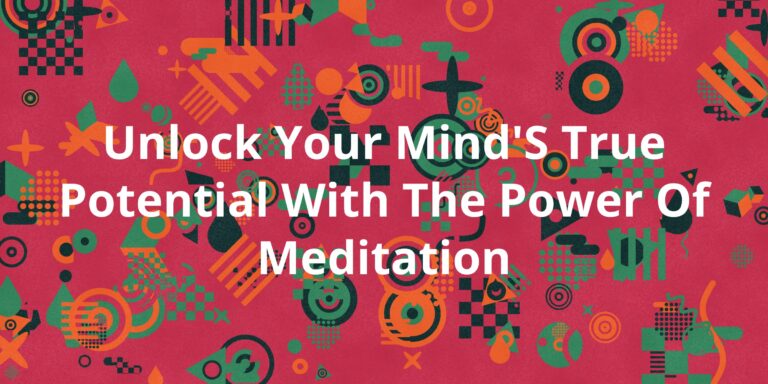Meditation has been practiced for thousands of years as a way to calm the mind, reduce stress, and increase inner peace. It is a powerful tool that can help you uncover your true self and live a more fulfilling life. In this comprehensive beginner’s guide, we will explore the basics of meditation, its benefits, and how to get started.
What is Meditation?
Meditation is a practice that involves focusing on your breath, body sensations, thoughts, or emotions to achieve mental clarity and emotional calm. It can be practiced in many different forms, including mindfulness meditation, transcendental meditation, loving-kindness meditation, and more. The goal of meditation is not to escape from reality or to achieve a particular outcome, but rather to develop awareness and understanding of yourself and the world around you.
The Benefits of Meditation
Meditation has numerous benefits that can improve your overall well-being. Some of the most common benefits include:
1. Reduced stress and anxiety: Meditation helps to calm the mind and reduce the production of stress hormones, which can lead to feelings of relaxation and peace.
2. Improved focus and concentration: Regular meditation practice can help to improve your ability to concentrate and stay focused on tasks.
3. Increased self-awareness: Meditation can help you develop a deeper understanding of yourself and your thoughts and emotions, leading to greater self-awareness.
4. Enhanced emotional well-being: Meditation can help to reduce negative emotions such as anger, fear, and sadness, while increasing positive emotions such as happiness, joy, and love.
5. Improved physical health: Meditation has been shown to lower blood pressure, improve immune function, and reduce chronic pain.
How to Get Started with Meditation
Getting started with meditation can be intimidating, but it doesn’t have to be. Here are some simple steps to help you get started:
1. Find a quiet place to sit or lie down comfortably. Turn off any electronic devices and close your eyes.
2. Take a few deep breaths, inhaling slowly through your nose and exhaling through your mouth. Focus on the sensation of your breath as it enters and leaves your body.
3. If your mind begins to wander, gently bring your focus back to your breath. Don’t judge yourself or try to suppress your thoughts; simply acknowledge them and let them go.
4. Start with just 5-10 minutes per day and gradually increase the duration of your meditation sessions as you become more comfortable with the practice.
5. Consider using guided meditations or apps to help you get started. There are many resources available online that can guide you through different types of meditation practices.
Tips for Successful Meditation
Here are some tips to help you succeed in your meditation practice:
1. Be patient and consistent. Like any skill, meditation takes time and practice to develop. Stick with it and don’t get discouraged if you don’t see immediate results.
2. Be open-minded and non-judgmental. Meditation is not about achieving a particular outcome or reaching a state of enlightenment. It is about developing awareness and understanding of yourself and the world around you.
3. Create a comfortable and peaceful environment. Find a quiet place to sit or lie down where you won’t be disturbed. Turn off any electronic devices and create a calming atmosphere.
4. Experiment with different types of meditation. There are many different forms of meditation, so try out a few and see which one works best for you.
5. Be mindful of your thoughts and emotions. As you meditate, you may encounter negative thoughts or emotions. Acknowledge them and let them go without judgment. Focus on the present moment and let go of any distractions.
Conclusion
Meditation is a powerful tool that can help you uncover your true self and live a more fulfilling life. With regular practice, you can reduce stress and anxiety, improve focus and concentration, increase self-awareness, enhance emotional well-being, and even



